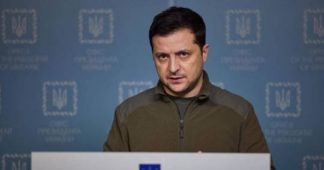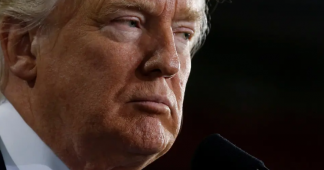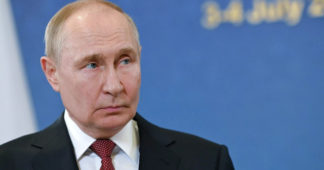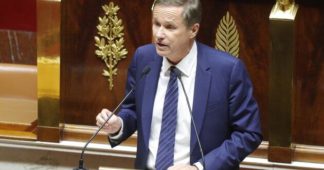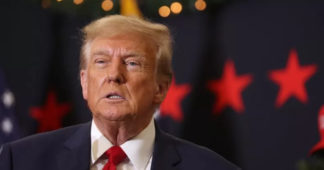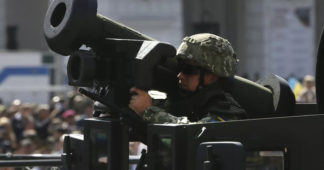Ukrainian legislator Oleksandr Dubinsky also emphasizes that the end of Zelensky’s power means the beginning of the audit of American military aid, which stands as a threat to the reputation of the “Dems”.
By Dmitri Kovalevich
25 Nov 2024
After Donald Trump’s election victory on November 5, the Ukrainian authorities and media are visibly concerned about a possible change of policy in Washington. During the recent presidential and Congress elections, US media close to the Democratic Party were full of scare stories that Trump and the Republican Party, if elected, would force Ukraine into negotiations and concessions with the Russian Federation.
The unelected, governing regime in Kiev is entirely dependent on Western powers for arms to pursue the war against Russia and for loans and investments to keep its economy afloat. For the regime, a ceasefire would likely prompt reductions in military and economic aid not only from the US but also from the European Union, Japan, South Korea (US$394 million for 2024), and other US satellites. It also means that public relations need to hold presidential and legislative elections and lift some of its harsh restrictions, including the ongoing ban against men traveling abroad.
A ceasefire would also mean an end to the vast corruption schemes surrounding the country’s obligatory military conscription. During the past two and a half years, bribes to avoid conscription have made millionaires of military enlistment officers and doctors who have the power to write exemptions.
The conflict in Ukraine is enriching arms manufacturers to an unthinkable degree, driving the prices of munitions to record levels. Ukrainian military expert Valentin Badrak stated at the VIA Carpatia 2024 forum in mid-November, “Russian ammunition cost $600 in 2022, and it still costs $600 today. Putin put down his foot and everything is produced as before, no one raises prices. European ammunition, meanwhile, which cost US $850 at the beginning of 2024 now costs $8,500.”
‘VIA Carpathia’ is a road transport improvement scheme by European Union countries in central Europe to improve road countries in Turkiye, the Caucasus region of southeast Europe, and elsewhere in western Asia.
See a fawning report about the forum held in Kiev here.
Badrak added that the dream project of Ukraine’s leaders to build their own rocket system with a range of 1,500 km will require a lot of financial resources, which the United States could help provide.
Zelensky told an interview with Suspilne Ukraine (national state broadcaster) on November 16 that he expects the new administration in Washington to wind down the war against Russia, but he doesn’t know when and how. “The change occurring in U.S. policy indicates that the war will end, but I don’t know how. Our task is not to give any opportunity to pressure or induce us into making concessions.”
“Talks with Russia are only possible if we are not alone at the table and provided that Ukraine is strong,” he said.
In the same interview, he affirmed that his regime will make its own decisions on any talks with Russia. Using words stretching credibility, he said, “We are an independent country. During this war, both our people and I personally, in negotiations with the United States, with Trump, Biden, and European leaders, have proven that the rhetoric of ‘sit and listen’ does not work with us.”
US billionaire Elon Musk responded to this by saying that Zelensky has an “amazing sense of humor,” stressing that Ukraine’s independence is fictitious. Commenting on Musk’s words, former Ukrainian legislator Igor Mosiychuk stated, “Musk unfortunately emphasized the obvious… For 33 years, our pseudo-elite has been running between Moscow and Washington, then to Brussels, Beijing, and even Istanbul looking for new masters and selling off state sovereignty at wholesale and retail prices.”
Zelensky is clearly nervous and even criticized Olaf Scholz for his recent conference call with Vladimir Putin. He said the German Chancellor is opening a ‘Pandora’s box’ by talking to his Russian counterpart, though, based on Berlin’s official statement, Scholz did not say anything new to Putin. He repeated earlier calls for negotiations with Ukraine to “conclude a just peace” and for Russia to withdraw its troops from territories that the Ukraine regime continues to call its own.
Canada’s Prime Minister Justin Trudeau has also voiced concern about possible aid cuts under a new Trump-led administration. “Let’s be very blunt: all the allies in the world would not be able to replace a complete withdrawal by the United States of support to Ukraine.” So far, the total amount of all funds allocated by the US Congress to assist Ukraine since the start of Russia’s special military operation has exceeded $182 billion.
This is prompting the Kiev authorities to find ways to scare everyone with peace. Former Ukrainian Foreign Minister Dmytro Kuleba warned on November 13 that a military revolt in Ukraine would ensue if the Trump administration were to agree to a peace deal with Russia on terms considered unfavorable. “If the Trump administration were to impose unpalatable peace terms on Ukraine and if Mr Zelensky were to agree (an unlikely scenario), part of Ukrainian society would resist. Domestic unrest would risk the country’s internal collapse. That would give Mr. Putin the victory he has long desired, painting Ukraine as a failed state. Responsibility for this would fall squarely on Mr Trump. But he cannot allow Ukraine to become his ‘Afghanistan’,” wrote Kuleba, referring to the humiliating defeat and withdrawal of the US and NATO military forces from Afghanistan culminating in August 2021.
It should be noted that in the 21st century, all ‘color revolutions’ and nationalist revolts against agreements or alliances with Russia, notably in Ukraine and Georgia, have been inspired and supported by Western powers. The people of Moldova most recently and Kyrgyzstan (Kyrgyz Republic) before have come under Western efforts to disrupt and break historic ties with Russia and the Russian Federation.
Complicating the position of the Ukraine regime and its Western backers is the fact that Ukraine’s military now consists of a great many forcibly conscripted soldiers. Those who have survived into the third year of war regularly warn through social media of excessive fatigue from life in the trenches with little or no rest, in addition to a host of other problems, including poor training and inadequate weapons.
Ukrainian political scientist Kost Bondarenko explains why many in the West fear peace in Ukraine. As reported by Politnavigator on Telegram on November 14, he said, “In the eyes and ears of Western leaders, the word ‘peace’ means ‘surrender’. The West believes that if the goal of internal ‘revolution’ in Russia is not achieved, that is, no collapse of the government led by Vladimir Putin occurs, that would mean billions of dollars of military hardware will have been thrown away for nothing.”
“This will then turn very soon into extreme problems for the leaders of the European Union, unlike what will happen in Russia… Military hawks in Europe are afraid of peace because for them, peace would mean an acknowledgment of their own defeat.”
Ukrainian legislator Oleksandr Dubinsky also emphasizes that the end of Zelensky’s power means the beginning of the audit of American military aid, which stands as a threat to the reputation of the “Dems”. “Trump’s goal is to show the deep corruption of the Democrats in the war in Ukraine. And Zelensky can participate in this either as their accomplice or as a ‘whistleblower’,” Dubinsky believes. But for now, Zelensky’s task, according to the lawmaker, is to prevent the war from ending in the next two years and to prevent the auditing of aid sent to Ukraine. Where has all the money gone?
At a recent meeting with French President Emmanuel Macron, the newly appointed secretary-general of NATO, former Dutch prime minister Mark Rutte, spoke in favor of continued war on Ukraine territory. “We must recommit to stay the course of the war, and we must do more than just keep Ukraine in the fight,” he said.
Nuclear blackmail rears its head once again
In mid-November, the UK daily Times published a report (as cited on Telegram by the Ukraine online news outlet Strana on November 13) that Ukraine could well embark on developing an elementary nuclear bomb within a few months should the new US administration reduce its military aid to Ukraine. Immediately after the report appeared in The Times, the Ukrainian Foreign Ministry issued a statement denying that such plans exist.
This is not the first time that such a dark suggestion has been aired. Usually, governments and their militaries keep quite silent about such ideas. If they do act upon them, they do so quietly. The editors of Strana explain that the proposal was prepared for the Ukrainian Defense Ministry’s purview but got into the hands of the British media without Kiev’s knowledge. The Times report then writes threatening words, saying the news “should serve as a wake-up call to members of the Trump administration, who see Ukraine as a pawn that can be sacrificed as part of a larger game.”
Strana wrote a lengthy message on Telegram two days later, saying, “The topic of a Ukraine-produced nuclear bomb is probably a message to Western allies, primarily to the Americans, that aid to Ukraine cannot be cut, just as Kiev cannot be forced to end the war on the front lines without first achieving a promise of NATO membership.” But Strana says it doubts the claims of the Ukraine regime that it can produce nuclear weapons (as opposed to crude ‘dirty bombs’ loaded with nuclear waste), which is also the explanation by many nuclear science experts in Russia. Strana warns that “threatening what you do not have is far from the most winning strategy.”
Former Ukrainian legislator and far-right nationalist Igor Mosiychuk doesn’t understand these nuclear threats. He wrote on Telegram on November 17, “Why are our military-political leadership and various talking heads in the Office of the President talking everywhere about Ukraine making a nuclear bomb? To do what? To provoke the Russians to strike not only at our energy infrastructure but to also use nuclear arms? Some people, after the election of Trump, want to continue the war and make a lame duck out of Trump should he talk peace. Such people do not care about the lives of Ukrainians!”
A neocolonial Ukraine?
Valeriy Zaluzhny, the ex-chief of staff of the Ukraine military and today the Ukraine ambassador to Britain, is suggesting that the UK government and its agencies take over the training and education of a new elite and future managers for Ukraine. Speaking to the annual general meeting of the European Business Association in Kiev on November 13, he said, “We have almost managed to convince the British establishment that the best, let us say, guarantee for their future investment in our country is to invest in its education, that is, to invest in the training of our future ministers, prime ministers, governors–even the future president.”
Zaluzhny’s words caused a storm of outrage among Ukrainian politicians. Legislator and former member of Zelensky’s party Oleksandr Dubinsky wrote ironically on Telegram on November 14, “Zaluzhny is the best. Asking the ‘white masters’ to prepare overseers and planters for us (and who else is needed to run a great agrarian power) in the best institutions in London is strong.”
“Zaluzhny is a good guy, asking the ‘white master’ to prepare for us a future role as overseers and planters, in the best traditions of Britain and its former empire. Who else is needed to manage a large agrarian state but such people? It’s quite the proposal; not to train and prepare future presidents, but to train the supervisors of a labor colony.”
Ukrainian political scientist Vadym Karasev is extremely indignant at such a blatant proposal for the colonization of Ukraine. “The ex-chief of the armed forces Zaluzhny is suggesting that every year, five to seven thousand future managers be sent for training in the UK so they may ‘grow up’. The British have long trained the managers of colonies, it is their specialty. But does Ukraine not have its own universities? This a proposal for the training of hand-picked bureaucrats to take over and manage the country.”
Karasev also recalls that Kiev regime president Volodymyr Zelensky has proposed a “victory plan” for Ukraine’s war against Russia that would gift American corporations access to Ukraine’s rich deposits of minerals. It would thus turn out that all the fighting by Ukrainian soldiers would have been done in the interests of certain US corporations. Karasev calls Zelensky’s ‘victory plan’ a proposal for “voluntary colonization”.
Ukrainian economist Oleksiy Kushch calls Zaluzhny’s musings a case of “intellectual neo-colonialism”. In a lengthy message on Telegram on November 13, he emphasizes that intellectual neocolonialism in Ukraine has so far brought only a colossal waste of the financial and geopolitical resources delivered by the West.
In a lengthy follow-up message, Kusch warns against taking the Western leaders for fools. “The West’s project in Ukraine stems from the fact that Ukraine is the only possible, remaining geopolitical platform to influence and incite the people of the Russian Federation to launch a pro-Western geopolitical project for Russia. All attempts to launch such a project from inside the country have failed,” he writes.
Kusch emphasizes that the West does not need Ukrainian resources or its living space. These are only of interest to the West as helpful in seeking to pressure and influence Russia. This is the final goal and the final stop. “I remember how during the time of President Kuchma in Ukraine [1994 to 2005], his administration launched the ‘Academy of Public Administration’ project. Its goal was to train the future personnel of our state. Today, we are witness to the total failure of this project. Now, a country Ukraine with well-established science and centuries-old universities is asking a foreign partner to prepare our future administrators. The argument is that ‘this is the best guarantee for investments you (the West) make in our future.’ Again, this is intellectual neocolonialism.”
He continues, “Fighting Russian imperialism [sic] in order to replace it with British neocolonialism is clearly not the strategy that can ensure the development of Ukraine and the survival of the Ukrainian nation in the 21st century.”
To achieve such ‘development goals’, according to the minds of their proponents, the war in Ukraine must continue. Various options will be used to disrupt any ceasefire and negotiations–from nuclear blackmail to assassinations. For the entire Western elite and the Ukrainian compradors tied to it, beginning with Zelensky and Zaluzhny, what is at stake is what they call a “rules-based international order.” But there is nothing new here: such ‘rules’ date back to the days of British colonizers marauding across Africa, India, Asia, and beyond.
We remind our readers that publication of articles on our site does not mean that we agree with what is written. Our policy is to publish anything which we consider of interest, so as to assist our readers in forming their opinions. Sometimes we even publish articles with which we totally disagree, since we believe it is important for our readers to be informed on as wide a spectrum of views as possible.
